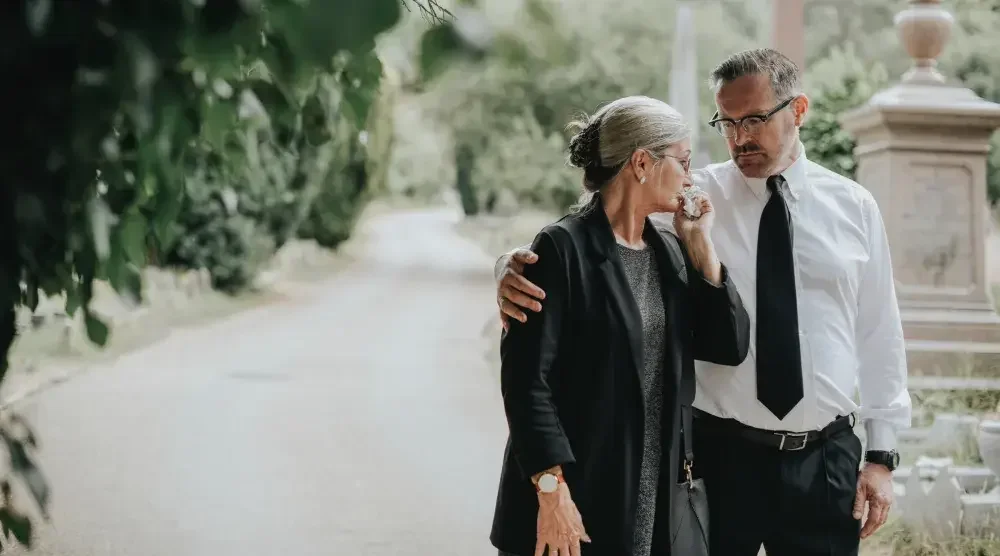If you’re reading this story and looking for advice, let us start by saying: We’re sorry for your loss. Whoever it is in your life who is now gone, we hope you take a moment to pause amidst the grief and the to-do list to remember all of the wonderful memories you share with that person.
There are many tasks in front of you in order to properly and legally close out someone’s life. These tasks will take time to complete, and it’s OK to pause for reflection, celebration, grief, and self-care.

This list of 10 steps will help you to get started on the journey. If you need more help along the way or run into a snag, LegalZoom’s directory of lawyers is waiting for you. You don’t have to navigate this journey alone.
What to do when someone dies checklist
Here are the first 10 steps you should take after the death of a loved one:
- Notify friends and family
- Make immediate arrangements for children and pets
- Take care of assets
- Find and review the will
- Make arrangements for the body
- Plan the funeral
- Obtain a death certificate
- Carry out last wishes
- Settle the estate
- Notify formal entities
While each step may sound simple, and some are, others may have multiple steps and require jumping through some legal hurdles.
10 steps to take after someone dies
If you’ve recently lost a loved one, let these 10 steps be your guide for what to do in the coming days, weeks, and months until you’ve completely settled the person’s affairs.
1. Obtain a death certificate
Within the first few weeks after someone’s death, you’ll want to obtain the death certificate. You can do this by contacting your county vital records department. A death certificate is created only after a medical professional has declared the person dead. If your loved one has died at home without care, you’ll need to call 911 and have the body transferred to the hospital for a declaration of death.
Once you get the death certificate, you’ll want to get at least six to 10 copies. These copies will be used to access bank accounts, start probate, file a life insurance claim, and settle other personal affairs.
2. Notify friends and family
Over the first few hours to days and weeks, you’ll want to take time to notify friends, family, and co-workers of your loved one’s death. You'll want to start with immediate family members.
This can be done through personal texts and phone calls, social media, and emails. Consider notifying the closest, most important people first.
Some ideas of who you might need to notify include:
- Family members
- Friends
- Employer
- Co-workers
- Acquaintances
- Old friends who they may have fallen out of touch with
- High school or college they graduated from
3. Make immediate arrangements for children and pets
Another task that you’ll want to take care of in the hours and days following the death of a loved one is making arrangements for any dependents.
If your loved one has any minor children, adults who aren’t able to care for themselves, or pets, you’ll need to arrange for their care for the short term. If there are children and no other surviving parents, you will need to file a petition for guardianship with the court.
If your loved one had a will or estate plan, the plans for their long-term care should be included in those documents. Your loved one’s wishes should be respected, if possible, and the care of dependents as decided in their will should be followed.
If there are no family members or friends who can take their pets, local humane societies often have a program for surrendering and re-homing animals.
4. Notify formal entities
Once friends and family have been notified and after you have opened the probate process, it’s time to reach out to any formal entities that need to know about your loved one's passing. This would include financial institutions, government agencies, and major credit bureaus. You may be able to contact some of these entities, including the Social Security Administration, retirement companies, and life insurance companies after you get a death certificate.
These notifications can be done by you or the executor of the estate, if there is one. You might need to reach out to:
- Social Security Administration
- Banks about financial accounts
- Mortgage company
- Financial advisors or brokers
- Insurance agencies
- Life insurance companies
- Credit agencies
- Credit card companies
- Department of Motor Vehicles to cancel their driver’s license
5. Find and review the estate plan
Before you move onto the following steps, you’ll first want to find and review the will or trust. Once you find it, you should contact an attorney to learn about the next steps needed to administer the estate. The will or estate documents will give you a good idea of your loved one’s final wishes and how they want their estate handled.
If someone dies without a will, then their assets will need to be distributed based on legal precedent, and the estate will need to go through probate court. Even if someone has a will, an estate will need to go through the probate process to be settled. You should contact an attorney or learn about self-help probate options at the local county courthouse where the decedent lived.
6. Make arrangements for the body
If your loved one has died at home without care, you’ll need to call 911 and have the body transferred to the hospital for a declaration of death.
Your next step, which should be completed as soon as possible, is to make arrangements for your loved one's body. The details of your loved one's wishes should be part of their will or estate plan documents.
This information will help you to make final preparations for their body and funeral. A funeral home can help you transport the body from the hospital or home to the facility where the funeral will be held.
You might need to make arrangements at this time for organ donation, preparing the body for a wake or open casket service, or fulfilling other wishes your loved one may have had.
7. Secure the property and assets
The next step you’ll want to take in the days after a loved one's death is securing immediate assets and property. This might include tasks and chores such as:
- Making sure their house and cars are locked
- Taking out any trash
- Checking their mail and notifying the post office to forward mail
- Bringing in any deliveries
- Cleaning out their refrigerator
These steps are temporary solutions to give yourself time before handling your loved one's estate. Eventually, their property will need to be cleaned out and repurposed or sold, but for now, you just need to do the basics.
8. Plan the funeral
After the first hectic days are done, it will be time to plan your loved one’s funeral. This is not something you’ll have to do alone. You can recruit the help of friends and family to help you plan this process.
Your first step in planning the funeral will be to assess your loved one’s will for their wishes. If they don’t have a will, but you know what they would want, you can plan accordingly.
Some tasks associated with planning a funeral include:
- Coordinating arrangements with the funeral home
- Sending announcements to those you’d like to attend
- Placing an announcement in the newspaper if the funeral will be open to the public
- Writing the obituary for the funeral pamphlet and newspaper
- Choosing where flowers can be sent or donations in lieu of flowers
- Planning food and other memorial components for the funeral or post-funeral gathering
Remember that you don’t have to do this alone. Your loved one's friends and your friends and family would be honored to help you get through this period of time. It’s OK to ask for help and to lean on others in your community at this time.
9. Inventory of the assets
Part of the work of making that inventory of assets is finding them all. The task, called marshaling the assets, can be a big job. Comb your family member’s tax returns, mail, email, brokerage and bank accounts, deeds, and titles to find assets. Don’t leave any safe deposit box or filing cabinet unopened.
10. Go to Probate Court or administer the trust
The final step on your to-do list is to settle your loved one’s estate. This can be a long process involving many legal and financial steps that can be confusing to navigate alone.
These steps are a starting place for settling an estate.
- Determine the executor of the estate: the executor will be named in the will or trust document and will manage the closing of the estate.
- Talk to a trust and estates attorney.
- Go through the probate process.
- Pay any outstanding debts and close accounts.
- Distribute any death benefits or remaining assets to beneficiaries.
You don’t have to settle your loved one’s estate on your own. If this task feels overwhelming or you’re not sure where to start, a probate attorney can help you navigate this process with ease.
What not to do when someone dies
Knowing what to do in the immediate aftermath of a loved one's death can help get you headed in the right direction while you’re overwhelmed with grief. We also have a few suggestions for things you shouldn’t do.
Here’s what NOT to do after a loved one dies:
- Do not give away or promise items to loved ones: It might be tempting to give possessions to friends and family, but it’s important to first assess your loved one’s will and complete the probate process. This is especially true for high-value possessions. These items might be promised to someone else or be needed to settle your loved one's estate or debts.
- Do not sell any personal effects or property: Similarly, you’ll need to follow the guidance from your family member in the will or trust before selling any personal items or property.
- Do not let someone move into the deceased person’s home: Your loved one's home must remain unoccupied until after probate has been settled. If you need to stay there while managing the estate, that’s OK, but you cannot rent it out or sell it until after the will has been reviewed and the estate settled.
- Do not drive their vehicles: Your loved one’s vehicles are registered to them, and the insurance covers them driving the vehicle. Wait to drive and sell their vehicle until the estate has been settled.
- Do not pay creditors on your own: Before your loved one's estate can be settled, their outstanding debts will need to be paid. Before paying any debts, it’s important to follow the probate process and speak to an experienced probate attorney. Debts should be paid in a specific order so that the estate can be settled efficiently.
- Do not feel pressured to make quick decisions: The process of settling an estate takes time. Sometimes months, if not years. If a friend or family member is pressuring you to make quick decisions or to give away possessions, don’t. You need to follow the will and wishes of your deceased loved one and allow the probate process to unfold properly. Rushing or giving away possessions too early can cause legal complications down the road.
- Do not neglect your own well-being and mental health: Most importantly, take care of yourself. The process of settling a loved one's estate would be difficult, even at the best of times. There are a number of complicated tasks that you will need to complete on top of your normal tasks. Remember to pause and take care of yourself, to ask for help, and hire experienced professionals to help you get through this difficult time. Your loved one would want you to be healthy and happy.
What if they died without a will?
If your person dies without a will or an estate, the process of handling their estate could be more complicated and will be governed by the state’s laws of intestacy (dying without a will).
In general, the process of settling an estate without a will follows these steps.
- File a petition for probate with the court, and they will assign an estate administrator.
- The administrator will gather documents, inventory assets, and pay bills, debts, and taxes.
- The estate will go through the probate process.
- Assets will be distributed to the determined beneficiaries, who are often the closest blood relatives.
Hiring an experienced estate attorney can give you peace of mind as you navigate this process. A local estate attorney will know your state’s laws and how the probate process will work in detail.
FAQs
What are the first legal steps to take after a death?
The first legal step you’ll want to take after a loved one's death is to contact family and friends.
What should be done about the deceased’s Social Security benefits?
A surviving spouse, child, or dependent parent may be eligible to receive survivor benefits based on a deceased’s social security benefits. If eligible, you can usually apply for these benefits after you receive the death certificate.

